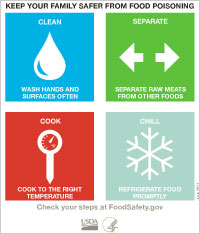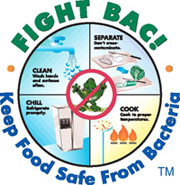 The holiday season is just around the corner, which means that you’re likely to be eating at any number of special dinners, buffets, potlucks, and catered events in the next few weeks. As you sit down to enjoy your meal, food safety is probably the last thing on your mind. But all it takes is one round with a food-borne illness to remind you why keeping your food safe is so important.
The holiday season is just around the corner, which means that you’re likely to be eating at any number of special dinners, buffets, potlucks, and catered events in the next few weeks. As you sit down to enjoy your meal, food safety is probably the last thing on your mind. But all it takes is one round with a food-borne illness to remind you why keeping your food safe is so important.
 Given that there are so many myths about food safety floating around out there, we thought we’d get some information straight from the source. And conveniently enough, the Ad Council, the USDA’s Food Safety and Inspection Service, the Partnership for Food Safety Education, and the FDA and CDC and their Food Safe Families campaign have all gotten together to give us some holiday-specific facts on food safety. (They’ve summed up the four basic principles in these neat little graphics.)
Given that there are so many myths about food safety floating around out there, we thought we’d get some information straight from the source. And conveniently enough, the Ad Council, the USDA’s Food Safety and Inspection Service, the Partnership for Food Safety Education, and the FDA and CDC and their Food Safe Families campaign have all gotten together to give us some holiday-specific facts on food safety. (They’ve summed up the four basic principles in these neat little graphics.)
What are some of the most popular food safety myths out there? Here’s a good one: How many times have you taken a potentially unsafe food and said, “As long as I microwave it, it’ll kill all the bacteria.” Wrong! Microwaves aren’t what kill bacteria; it’s the heat from the microwave that kills bacteria. Microwaved food is often heated unevenly – even in microwaves with turntables – because of variations in food texture and thickness. So don’t assume that your microwaved food is evenly and safely heated. If your food needs to be heated to a safe temperature, check the temperature in several different spots.
Or how about this one: “You have to wash all bagged lettuce and greens or else you might get sick.” Good news – you don’t have to! As long as your bagged greens are labeled “ready to eat,” “washed,” or “triple-washed” you are good to go. In fact, by washing them in your home sink you may inadvertently contaminate them.
Here’s another one that we hear a lot around Thanksgiving: “If the meat is cooked, it’s fine to sit out.” False! Foods should not sit at room temperature for more than two hours. So eat that turkey, and move it back into the fridge when you’re done. Check out more in the handy chart below:
![Infographic-False-Food-Myths-blogsize[1]](https://jollytomato.com/wp-content/uploads/Infographic-False-Food-Myths-blogsize1-565x600.jpg)
One last thing to remember: According to the federal Food Safety and Information Service, bacteria are everywhere, but a few types especially like to crash parties. Staphylococcus aureus, Clostridium perfringens and Listeria monocytogenes frequent people’s hands and steam tables. And unlike microorganisms that cause food to spoil, harmful or pathogenic bacteria cannot be smelled or tasted. Bottom line: Prevention is safe food handling.

 Hi! I'm Jeanne Fratello - a writer, reporter, and food enthusiast who is on a mission to write great stories about food and where your food comes from.
Hi! I'm Jeanne Fratello - a writer, reporter, and food enthusiast who is on a mission to write great stories about food and where your food comes from. 
No comments yet.